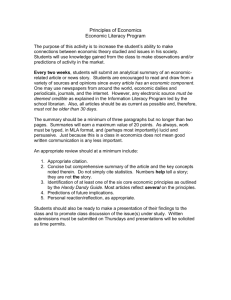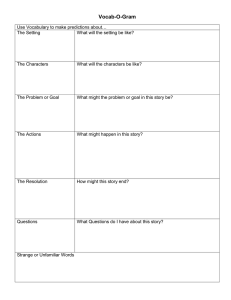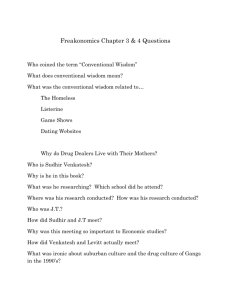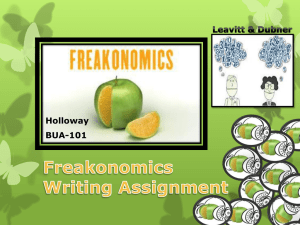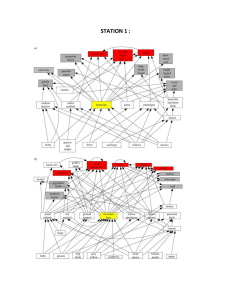Lecture 1 The Science of Economics
advertisement
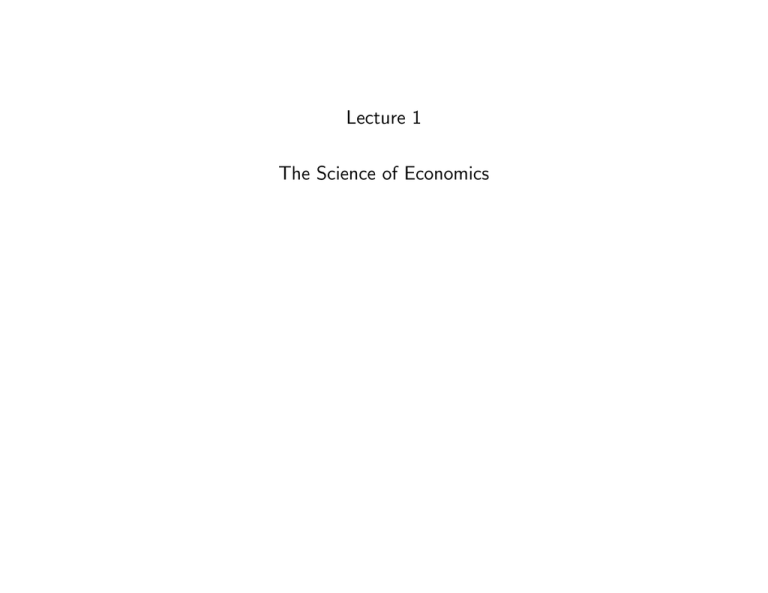
Lecture 1 The Science of Economics Economics is a social science: goal is to understand and predict human behavior (both individual and group) Note: accurate predictions do not necessarily imply a good understanding • E.g., one may predict that the sun will appear every morning, without understanding why this is so On the other hand, better understanding is likely to lead to better prediction Prediction usually entails making conditional forecasts: if A then B Understanding something means being able to explain if A then why B? Note: almost always, “the truth” behind the dependence of B on A remains hidden (assuming that it even exists) When this is so, the only way to understand/explain is by way of theory A theory is a set ( ⇒); where • is a set of exogenous objects (phenomena that are taken as given) • is a set of endogenous objects (phenomena that are to be explained) • ⇒ a logical mapping between and ; i.e., ⇒ Theory is useful because: [1] can make conditional forecasts: if then ; and [2] can be used as an interpretative device (an explanation for if then why ) Karl Popper: a theory is scientific if and only if it generates predictions that can (at least in principle) be falsified by empirical observation Any theory without this property is called a tautology (impossible to refute by any empirical observation) There are an infinite number of tautological theories consistent with any given observation; there is no scientific way to discriminate between them (choice is typically governed by religion) Religion: an unshakable belief that something is true or false Science: a tentative (evolving) belief that something may be more or less true or false At any point in time, the field of economics (as in any other science) consists of many competing theories Frequently, there is a theory that comes to be widely accepted or “conventional wisdom” Many appear prone to taking conventional wisdom as truth (i.e., a religion) Perhaps this is because there is such a high demand for religion? The conventional view serves to protect us from the painful job of thinking (John Kenneth Galbraith) Ironically, if economic theory teaches us anything, it is that we do not know very much and that there is still much to learn Not a comforting message for those who demand religion! It ain’t what you don’t know that gets you into trouble. It’s what you know for sure that just ain’t so. (Mark Twain) The trouble with the world is not that people know too little, but that they know so many things that ain’t so. (Mark Twain) Conventional Wisdom (example): Lemming populations commit mass suicide by jumping off cliffs. • Fact: Lemmings do not commit mass suicide by jumping off cliffs. This myth became widely accepted following the 1958 Disney film White Wilderness, which won an Academy Award for Documentary Feature, in which footage was shown that seems to show the mass suicide of lemmings. A CBC documentary, Cruel Camera, found that the “Norwegian” lemmings used for White Wilderness were flown from Hudson Bay to Calgary, where they did not jump off the cliff, but were in fact launched off the cliff using a turntable Why So Much Mathematical Modeling in Macroeconomic Theory? A model economy is simply an abstract representation of a real economy Keep in mind that the real world is just an example (there are many hypothetical worlds that may be of interest) An economist is someone who sees something working in practice and asks whether it might work in theory (Ronald Reagan?) Sure—we see something “work” in practice. But do we know that it “works” in all circumstances? As for math, it is simply a language. It turns out to be a convenient language for the purpose of expressing theory Much in the same way that this language: is useful for the purpose of expressing musical sounds. Math forces us to be explicit about the assumptions that are being made and it helps to discipline our interpretations with logic Being clear in this manner invites constructive criticism; it leads to intelligent debate The alternative is painful, confusing, and unconstructive (see CNBC) Our Approach [1] Identify an interesting economic phenomenon [2] Develop a model economy, consisting of model people who face decisionproblems similar to real people [3] Deduce the logical consequences of the assumptions assumed to rule this model economy and see how behavior is predicted to change in response to exogenous changes in the environment [4] Critically evaluate to what extent predictions are consistent with observation; and evaluate plausibility of economic mechanism highlighted by theory Note: Competing theories should be evaluated on the accuracy of their predictions; and not on the descriptive realism of their assumptions (Friedman, 1953) I like to think of theories (or models) as tools that help us organize our thinking The theory of economics does not furnish a body of settled conclusions immediately applicable to policy. It is a method rather than a doctrine, an apparatus of the mind, a technique of thinking which helps its possessor to draw correct conclusions. (J.M. Keynes) It is also an apparatus that is useful for detecting the flaws in “reasoning” provided by others (a BS detector, if you will)
